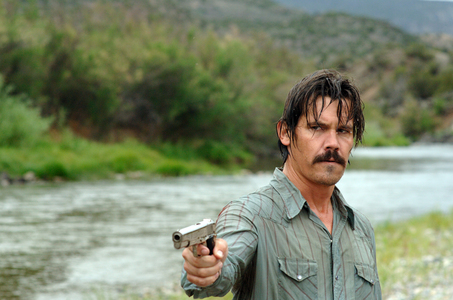On my Superlatives list at the end of last year, I awarded No Country for Old Men “Most Disappointing Film of 2007.” Here’s what I wrote:
Although it was by no means bad, I was disappointed in the Coen’s adaptation of Cormac McCarthy’s No Country for Old Men. It was a good movie–Javier Badem was fantastic, great pacing and tone–but still it didn’t blow me away like, say, Fargo or Blood Simple or Miller’s Crossing did. Ditto Werner Herzog’s Rescue Dawn. Chalk it up to hyperbolic expectations, I guess. Maybe I need to watch these films again on DVD and reconsider.
Ok. So. I went back and watched No Country on DVD this weekend. One of my criteria for a great film is that it has to be great without the transfixing power of a huge screen and roaring sound system. The Lord of the Rings movies, for example, suffer greatly on TV; the epic magnitude is diminished, and you realize just how much the movies relied on the the modern movie screen. I still like them though. I just don’t think they work too well on small screens (god forbid you watch them on a phone). So how does No Country hold up?
I don’t think it fairs any worse, but I still have to argue that this movie is incredibly overrated. I’d read the book (listened to the audiobook, actually) before I’d seen the film the first time, and watching it again I was doubly-prepared for the film’s decidedly non-Hollywood ending (and non-Hollywood climax, to boot).
Oh, by the way, a few SPOILERS ARE COMING UP. Fair warning, right?
Ok. When I initially saw the film, many of the people of the audience were disappointed and angered at the end of the movie, including my mom’s cousin, a man in his sixties from South Carolina. My uncle zoned out at the end, during Tommy Lee Jones’s last speech. When the movie ended and we walked out of the theater, he asked me to explain what happened. He’d missed the end. Three young men overheard, came up, and started asking me questions– “Did that guy [Llewellyn Moss] die?” etc. My mom’s cousin summed up the way a lot of people probably felt about the end of this movie– “I didn’t like it that the bad guy got away and the good guy died. Why didn’t the Sheriff go get him?” That the film is deeply dissatisfying to our collective sense of justice is kind of a thematic point, and that’s not what bothers me about No Country–although I understand why it would bother many audience members.

The film omits the two scenes we ache to see–the initial massacre that sets events in motion, and the death of Llewellyn Moss. We barely get to identify Llewellyn’s body, in fact. The substitutions for these elisions all involve Anton Chigurh, who pretty much steals the show. His murder of a deputy at the beginning of the film enacts a sacrificial slaughter, a substitution for the greater violence of the drug massacre that we don’t witness. He murders Carson Wells, a silly and ultimately trivial character whose sense of self-importance is quickly put under erasure. Finally, he kills Carla Jean Moss, before becoming the victim of a random violent car accident. An accident–not a just punishment for the atrocities he’s committed. Despite the severe accident, Chigurh is able to get up and walk away; presumably, he will continue to wreak havoc. Before Chigurh leaves the screen he turns two boys against each other. They squabble over a bloodied piece of money, recapitulating the larger theme of the movie–an echo of Fargo–that greed is destructive. The message is not overstated, but plain nonetheless. So what’s wrong with this film? Nothing, really. It’s just not as good–and certainly not as profound–as everyone makes it out to be.
In the book, the third act rests mostly on the “old men”–Tommy Lee Jones’s Sheriff Ed Tom Bell, a fellow sheriff, and Ellis, Ed Tom’s uncle. The film omits much of the book here, including a scene where Ed Tom visits another “old man”–Llewellyn’s father. The film also omits a key story from Ed Tom’s past, an act of cowardice in war. The Coens were right to leave much of this stuff out–there are too many monologues from Ed Tom as it is. Still, the titular point of the book becomes eclipsed, subsumed into Chigurh’s violence. Chigurh is a “new man,” part of what Ed Tom perceives as a new direction in our country–a violent and impersonal world he doesn’t belong in. Ed Tom fails to realize that the country was founded and maintained in many ways via impersonal violence, despite the fact that his own past–as well as the past of his family–is entrenched in this violence. His real problem is with the lack of clear, absolute morality, pure right and wrong, good and evil, an attitude best summed up with his assertion that once people quit saying “Ma’am and Sir,” everything else goes to hell. He brushes off Ellis when the old man tells him that the country has always been violent and difficult. The movie ends the same as the novel, with Ed Tom relating two dreams he had about his father.

The film ultimately fails to relate the depth of the novel, opting instead for a competent depiction of the surface tensions at work. The Coens accurately captures the “men doing stuff” aspect of McCormac’s writing without getting to any of the meaning behind it all. And that’s fine. The movie’s fine. It’s just not as great as everyone is pretending it is. Perhaps we’re all just so happy that the Coens have stepped up from their previous lightweight projects–The Ladykillers and Intolerable Cruelty–that we feel the need to fawn all over No Country. Or maybe I’m wrong–maybe this is a profound thriller, a truly excellent movie; maybe this is the Coens’ masterpiece. But I think not.



